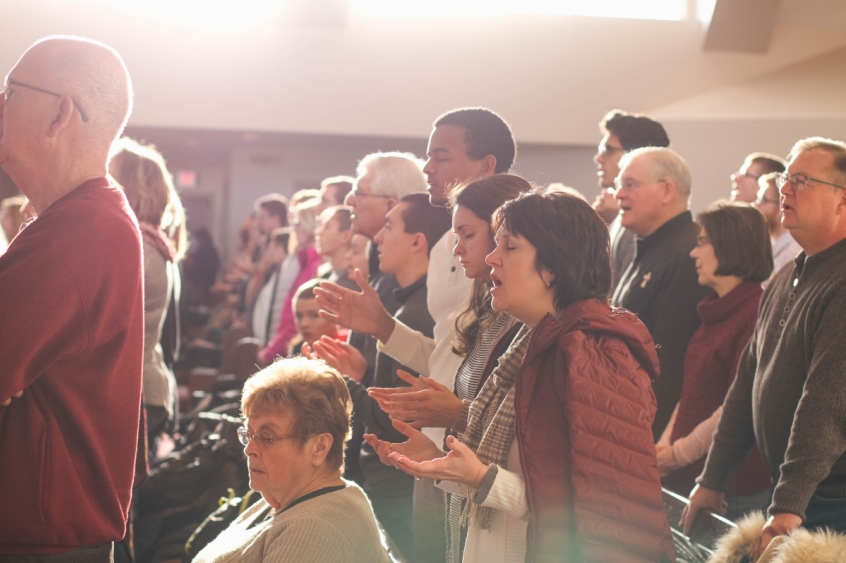
The story of God used to be passed down orally - the tradition of story telling being key to passing on faith when the world had many people who couldn't read or access scripture.
But have we lost this tradition in favour of the written word? Today, discipleship is more often done through recommended books than face to face contact and this style of nurturing faith is causing a major problem for some.
Each day 250 people start to lose their sight and more than two million people in the UK are living with sight loss severe enough to have a significant impact on their daily lives.
As well as this, 15% of people have dyslexia. Some have both dyslexia and a visual impairment.
If churches represent the diversity of their communities and have people with sight loss and reading difficulties in their congregations, you will soon see that there is a significant percentage of people unable to access reading as their key method of learning and discipleship.
It's useful to know that those who have any form of visual impairment have a limited amount of 'sight energy' each day. You might be able to see a bit in certain circumstances, but it takes energy. Those with chronic illnesses or pain conditions have the same problem - giving time to reading books, even ebooks, takes away sight energy you need for work and living life. So when faith and discipleship are based mainly, or in some cases only, on reading it's an issue we need to address.
What about listening to text to speech from a Christian Ebook? I challenge you try it. Most eReaders do not recognise 'christianese' and miss pronounce it, bible references are read poorly, and the voice is jerky and expressionless. So even if books are available electronically, it's hard to 'read' and understand them.
We're told that there are lots of Christian books recorded by this or that organisation. Great! But it won't be the book we want to 'read' along with our friends, or the study guide we're working through with our home groups. It won't be the book recommended by the preacher on the subject they've just preached on. It certainly won't be that theology book we've been desperate to read for years.
It's wonderful that you can get podcasts and Facebook live Bible teaching, but you have to sift carefully to find the good stuff, especially things that can form a part of regular discipleship. Should our ministers be recommending these as well as books?
But there may be things those of us with sight loss can do.
We could guide our churches in making services and discipleship more visually accessible, and take away the assumption everyone can read the print version of a book.
We could challenge publishers to always have accessible alternatives to printed books on the day the print version is released – not months later, if at all.
But thinking practically, there are ways to make sure we at least daily meditate on scripture. There are apps that deliver a daily verse to your phone, and read them to you. There are free audio bible apps that may help with this too, such as Bible Gateway.
When you read a longer Bible passage you can often miss things in the text – whether you struggle to read or not. I have found that this is the same when you listen to longer passages too. So try listening to shorter passages in a bible app. Find your own level, but make sure scripture, however short, is part of your daily diet. Pick a book in the Bible and listen to a few verses a day, even if it takes three months to get to the end of that book. Re-listen to them, incorporate them into your prayers and think about them during the day.
Find an accessible book you want to listen to, and find friends to read the same book, at the speed you can manage. Meet to talk about it.
If you are visually impaired, visit the Torch Trust website to access their audio collection or the Christian Today Digest that this website produces in partnership with the charity in Braille and large print format.
If you can afford it, take out a subscription with an audio book company as this makes buying audio books cheaper. I've found superb discipleship books this way – but here in the UK they may not be the ones recommended by your ministers.
Finally, rise above the guilt you may feel because you cannot access faith in the same way as your book worm friends. Discipleship will look different for everyone, and our faith is not 'less than' because we can only access small chunks of the Bible or other books at a time. Our faith is just as valid regardless of how and how much we can 'read'.
Kay Morgan-Gurr is Chair of Children Matter and Co-Founder of the Additional Needs Alliance, part of the Evangelical Alliance Council. For more, www.kaymorgangurr.com and on Twitter @kaymorgan_gurr













